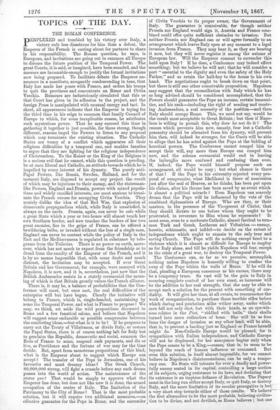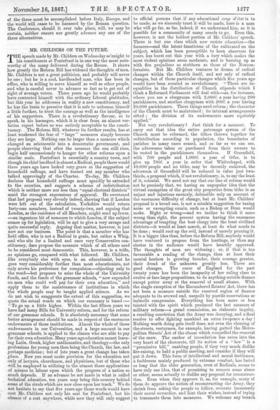TOPICS OF THE DAY.
THE ROMAN CONFERENCE.
pERPLEXED and troubled by his victory over Italy, a victory only less disastrous for him than a defeat, the Emperor of the French is casting about for partners to share in his responsibility. The Roman question, he says, is European, and invitations are going out to summon all Europe to discuss the future position of the Temporal Power. The great Courts, it is said, or imagined, have been sounded, and the answers are favourable enough to justify the formal invitations now being prepared. To facilitate debate the Emperor an- nounces in a manifesto, arrogantly condescending in tone, that Italy has made her peace with France, and orders his troops to quit the provinces and concentrate on Rome and Civita Vecchia. Rumours are industriously circulated that this or that Court has given in its adhesion to the project, and the foreign Press is manipulated with unusual energy and tact. In short, all appearances indicate that the Emperor is trying for the third time in his reign to summon that family Council of Europe to which, for some inexplicable reason, he attributes such mysterious power. That he may succeed this time in gathering it together is just possible, for three strong, though different, reasons impel the Powers to listen to any proposal which may terminate the existing situation. The Catholic States are weary of a conflict which aggravates all their religious difficulties by a temporal one, and enables fanatics to argue that they are fighting for the religious independence of Christendom. To the Kaiser or the King of the Belgians it is a serious evil that he cannot, while this question is pending, be at once liberal and Catholic, an attitude towards which he is impelled by every interest of his dynasty. The purely anti- Papal Powers, like Russia, Sweden, Holland, and for the moment Italy, are disposed to accept any project tire result of which may be injurious to their enemy, and the statesman- like Powers, England and Prussia, powers with mixed popula- tions and widely ramified interests, are most anxious to termi- nate the French excuse for occupying Civita Vecchia. They acutely dislike the idea of that Red War, that explosion of democratic propagandism which, while Italy is unsatisfied, is always on the cards. Prussia, again, can never be safe while a great State which a year or two hence will almost touch her own Southern border, and now touches the borders of her two great enemies, lies in the gripe of France, can be offered a bewildering bribe, or invaded without the loss of a single man, England can never be content while the policy of Italy in the East and the Mediterranean is regulated in substance by tele- grams from the Tuileries. There is no power on earth, more- over, which has not much to expect from the friendship or to dread from the enmity of the Emperor of the French, and it is by no means impossible that, with some doubt and much distrust, the invitation may be accepted. If ever Great Britain and her Government, for example, were annoyed with Napoleon, it is now, and it is, nevertheless, just now that the British Ambassador assists in a stately ceremonial the mean- ing of which is that Britain greatly values the French alliance.
There is, it may be, a balance of probabilities that the Con- ference will meet, but once met, the real difficulties of the enterprise will but have begun. Clearly the initiative will belong to France, which is, single-handed, maintaining by arms the Temporal Power, and what is France to propose ? We may, we think, set aside the wild propositions discussed in Rome and a few fanatical salons, and believe that Napoleon will suggest some endurable or possible compromise between the conflicting ideas,—but what is it to be If he proposes to carry out the Treaty of Villafranca, or divide Italy, or restore the Papal States, there is of course nothing left for Italy but to proclaim the Republic, democratic and social, summon the Reds of France to arms, suspend cash payments, and die or live, as Providence and the fortune of war may for the time decide. But, apart from monstrous propositions of this kind, what is the Emperor about to suggest which Europe can accept The transfer of the Pope to Jerusalem, one of his favourite and most dreamy ideas The Greek Church, 80,000,000 strong, will fight a crusade before any such dream passes into the world of action. The maintenance of the status Quo? That would be simply to approve what the Emperor has done, but does not like now it is done, the armed occupation of the centre of Italy. The limitation of the Patrimony to the City of Rome? That is the most probable solution, but it will require two additional measures,—an effective guarantee for the Pope in Rome, and the surrender of Civita Vecchia to its proper owner, the Government of Italy. The guarantee is conceivable, for though neither Prussia nor England would sign it, Austria and France com- bined could offer quite sufficient obstacles to invasion. But neither Prussia nor England can or will agree formally to an arrangement which leaves Italy open at any moment to a legal invasion from France. They may bear it, as they are bearing it now, but they will never register it among the axioms of European law. Will the Emperor consent to surrender this hold upon Italy? If he does, a Conference may indeed effect something; but we believe he will not; that he will consider a. port "essential to the dignity and even the safety of the Holy Father," and so retain the hall-key to the house in his own hand. The negotiations ought to break down on that point, but there is still one other conceivable proposition. Napoleon may suggest that the reconciliation with Italy which he has so long advised should be considered accomplished, that the Powers should guarantee the Pope an income, certain immuni- ties, and his rank—including the right of sending and receiv- ing Ambassadors, a real necessity of the position—and then Italy should occupy Rome. This, we need not say, would be the result most acceptable to Great Britain ; but then if Napo- leon is willing to permit this, why does he not do it ? The. reason which prevents him now, namely, fear lest a Catholic peasantry should be alienated from his dynasty, will prevent him then, will indeed be stronger, for the Cures will be able to allege that he has acted against the Pope at the bidding of heretical powers. The Conference cannot compel him to accept their will, any more than Europe can compel him_ now, and the solemn ceremonial would end in leaving the imbroglio more confused and confusing than ever. If, indeed, the Pope would himself propose such an arrangement, all would be easy ; but what chance is there of that ? If the Pope in his extremity rejected every pro- posal of compromise, what likelihood is there of concession just after the seal of Heaven, as he thinks, has been put upon his claims, after his throne has been saved by an event which is almost a political miracle ? Even Napoleon can scarcely dream that the Pope will be influenced by the vote of the combined diplomatists of Europe.. Who are they, or their masters, in the presence of the Vicegerent of Christ, that they should dictate to one before whom they ought to be prostrated, in reverence to Him whom he represents ? It must seem, even to a moderate Catholic, almost farcical to sum- mon Turk and Greek, Lutheran and Voltairian — enemy, heretic, schismatic, and infidel—to decide on the extent of independence which ought to remain to the only true and saving Church. The Pope will do nothing except bend to a violence which it is almost as difficult for Europe to employ as for Italy alone, and till he yields Napoleon will fear, except in the crisis of a great war, to destroy the Temporal Power.
The Conference can, so far as we perceive, accomplish nothing unless Napoleon is honestly willing to confine the sway of the Pope within the walls of Rome. If he will do that, pleading a European consensus as his excuse, there may be a temporary truce. So vast will be the gain to Italy in securing complete control of her own coast, so immense will be the addition to her real strength, that she may be able to accept such a solution for the present with something of cor- diality. It will give her time, at all events, to recommence the work of reorganization, to purchase those terrible rifles before which daring and patriotism alike wither away, under which men fall not only shot, but with their heads, as an eye-wit- ness relates in the Post, "riddled with balls," their skulls turned into mere cullenders of bone. She will be as free from the danger of invasion as any other land, will be able, that is, to prevent a landing just as England or France herself might do. Non-Catholic Europe would be pleased, for it sympathizes with Italian independence, and Catholic Europe will not be displeased, for her annoyance begins only when the Pope ceases to be a King,—ceases, that is, to seem to be beyond the reach of human influence or command. But even this solution, in itself almost impossible, for we cannot believe in Napoleon's disinterestedness, can be only a tempo- rary one. No State will tolerate for ever a deadly and power- fully enemy seated in its capital, controlling a large section of its subjects, urging resistance to its laws, and declaring that its existence is an impious defiance of Revelation. The Papacy must in the long run either accept Italy, or quit Italy, or destroy Italy, and the mere limitation of its secular prerogative is but - a very short step towards either of those results. We believe-- the first alternative to be the most probable, believing civiliza- tion to be divine, and not devilish, as Rome believes ; but one of the three must be accomplished before Italy, Europe, and the world will cease to be harassed by the Roman question. The Conference, should it ever take place, will, we may be certain, neither ensure nor greatly advance any one of the three alternatives.



































 Previous page
Previous page